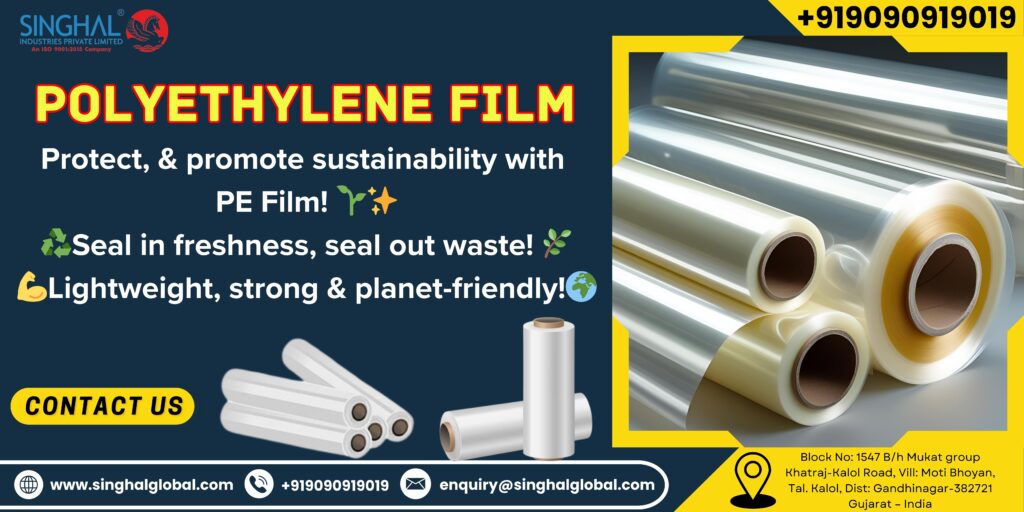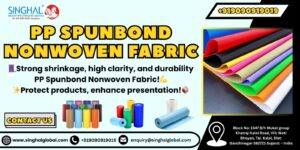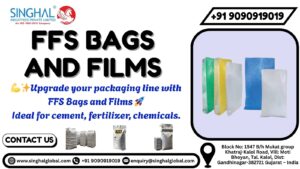With the ever changing face of agriculture and horticulture, the issue of innovation has continued to define productivity and sustainability. Polyethylene (PE) film is one of such remarkable materials that is becoming immensely popular all over farms and greenhouses due to its unimaginable utility and effectiveness. Since major manufacturers of PE film, PE film suppliers and manufacturers of polyethylene film keep advancing their production of this type of film, it has become an inseparable tool of contemporary farms and cultivators.
Understanding PE Film: A Versatile Solution
PE film can also be called polyethylene film, which is a plastic sheet mostly composed of polyethylene resins. It is also very simple, flexible, long lasting, and adaptable. PE film can be classified into various varieties such as Low-Density Polyethylene (LDPE), Linear Low-Density Polyethylene (LLDPE), and High-Density Polyethylene (HDPE) which provide a variety of different advantages, depending on the intended use.
PE film finds wide application in agriculture and horticulture including soil cover, mulch, greenhouse roof, crop and silage wrapping. It is very productive and easy to use, which is why it is great to implement in the largest propagation companies as well as the small-level growers.
PE Film in Greenhouse Applications
The application of PE film as a covering material on greenhouse is one of its most prolific uses. Transparent or nontransparent PE films enable the passage of light and keep the inside temperature and humidity. This would aid in increasing the growth of the plant and the ability to grow out of season.
UV stabilizers and thermal insulative films are also found in modern greenhouse films to extend life and give better crop production. Numerous PE film effervescent suppliers propose a specialized construction that covers a variety of climatic regions and crop-based needs.
Mulching with PE Film
Mulching involves spreading of PE film above the soil to suppress weed growth, conservation of moisture and control of soil temperature. Mulch films (black or silver) come in handy especially in the cultivation of vegetables as it raises the output and lowers herbicides use.
The practice does not only enhance the arrangement of soil but also covers like a system of guarding against harsh weather periods. PE mulch film also minimizes the evaporation of water hence making water efficient farming.
Silage Wrapping and Crop Storage
Silage plays a very important role in fodder production and its conservation should refer to good nutritional content. Silage The PE film is commonly used in wrapping silage bales to make them airtight and preserve moisture, stopping spoilage.
Polyethylene film manufacturers are providing multi layered PE films which are used in silage wrapping. These motion pictures are protective against UV radiation and offer great barrier performance hence suited to long-term outside storage.
Soil Solarization for Pest Control
The PE film is also used to implement a technique known as soil solarization involving laying of clear plastic film over the soil in summer months in order to trap solar heat. This can aid in the eradication of soil borne diseases, nematodes and weed seeds without any chemical.
This environmentally sound way of controlling the pests is becoming quite popular in organic and sustainable agriculture. It demonstrates how polyethylene film contributes to the productivity of things and hazard-free atmosphere.
Water Conservation Through PE Film
Water shortage has become a rising trend in agriculture and PE film can help a great deal regarding the water conservation. In addition, PE film tubing systems and sheet lining is a typical part of drip irrigation systems and this facilitates an effective utilization of water since it guides the water to the roots of the plants. This use of PE film is especially useful in arid and semi arid areas.
PE Film in Horticultural Packaging
PE film is the most popular packaging film in the horticulture industry (packaging flowers, plants, and produce) besides on-field usage. Its clarity and shielding make it preserve what is in it during storage as well as transportation.
Custom made PE sleeves and wraps usually are also utilized by floriculture business to package flower bouquets and by nursery to package young plantings. Most PE film manufacturers are providing printable PE film to aid in branding and product recognition.
Environmental Aspects and Recycling
One concern often associated with plastic usage is its environmental impact. However, PE film stands out for being one of the more recyclable plastic materials. Many polyethylene film manufacturers offer recyclable variants and participate in closed-loop recycling systems.
Additionally, some manufacturers are developing biodegradable and oxo-degradable PE films that offer shorter lifespans in the environment. This is especially important for agricultural applications where used films are collected and processed after the growing season.
The recycling process of PE film involves cleaning, shredding, melting, and re-extrusion into pellets, which can be used to make new film products or plastic items. Therefore, the end-of-life management of PE film has improved drastically in recent years.
Conclusion
PE film has changed agriculture and horticultural practice in a definite way due to its flexibility, affordability and low maintenance. It can be used in mulching and greenhouse roofing, silage wrapping and water conservation among many other things.
The future of productive and sustainable agriculture cannot be any brighter as PE film suppliers and Polyethylene film manufacturers in India keep advancing. You might be a farmer, a horticulturist, or a greenhouse owner, but the decision to incorporate PE film into your working process can turn out to change the game in terms of protecting crops and saving resources.
Frequently Asked Questions (FAQs)
Is PE film suitable to food packaging?
Sure we do food packaging using PE film because of its superior water vapor barrier quality and safety record. It is not toxic, elastic and perfectly covers the food in the regard that no external source can tamper with the food, which makes it perfect as fresh goods wrap, baked goods wrap and it can even be used to wrap frozen foods.
What industries use PE film the most?
Most uses include: construction, food packaging, pharmaceuticals, automotive and textiles although agriculture and horticulture are also very high uses of PE film. It is used as vapor barriers in construction and in the medical field as hygienic and sterile packaging.
How strong is PE film compared to other plastics?
PE film could not withstand as many mechanical loads as polypropylene or PET, but it has high flexibility, tear strength, and stretch. Such characteristics cause it to be applicable in applications with high sealing strength and flexibility.
Is PE film safe for medical packaging?
Yes, there is medical grade polyethylene film and it is used to wrap objects as gloves, syringe, and surgical instrument. It is not reactive, not active and also harmless to sterilized products. The movie has however been required to be of certain standards of regulations to be utilized in the medical field.









